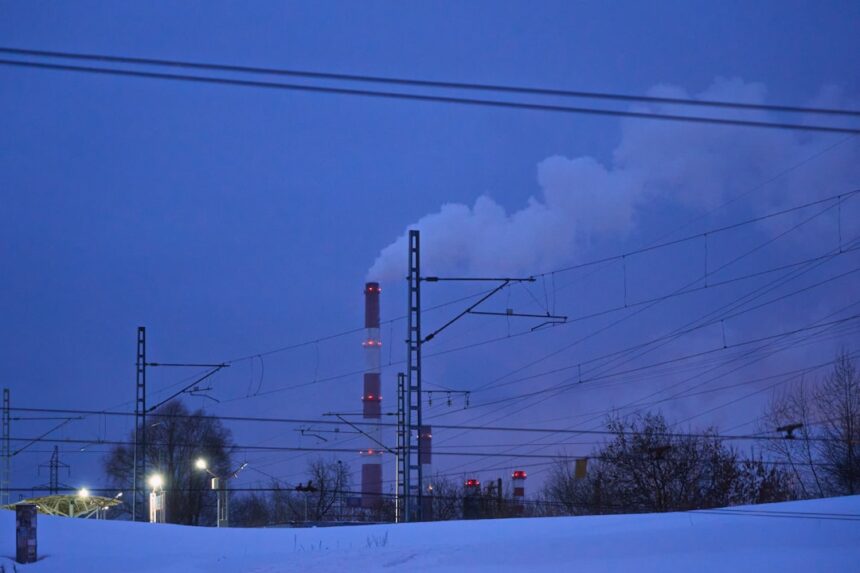Gazprom, the state-controlled gas giant of Russia, stands as a pivotal player in the realm of international energy markets and geopolitics. Founded in 1989, the company has grown to become the largest producer of natural gas in the world, significantly influencing not only the Russian economy but also the broader landscape of global energy supply. Gazprom’s operations extend far beyond mere commercial interests; they are intricately woven into the fabric of Russian foreign policy.
The Kremlin has adeptly utilized Gazprom as a tool for exerting influence, fostering alliances, and asserting its presence on the global stage. The relationship between Gazprom and Russian foreign policy is symbiotic. As a major revenue generator for the state, Gazprom’s profits bolster the Russian economy, allowing the government to fund various initiatives, including military and diplomatic endeavors.
Consequently, Gazprom’s strategic importance transcends economic metrics; it serves as a cornerstone of Russia’s geopolitical strategy, shaping its interactions with both allies and adversaries.
Key Takeaways
- Gazprom plays a significant role in shaping Russian foreign policy through its dominance in the energy sector.
- The geopolitical importance of Gazprom’s energy resources has a major impact on Russia’s relations with European countries.
- Gazprom’s influence extends to shaping Russia’s relations with former Soviet republics and its impact on Russia’s relations with China and Asia.
- Gazprom also plays a role in Russian foreign policy towards the Middle East and North Africa, as well as its influence on Russia’s foreign policy towards the United States.
- Despite its influence, Gazprom faces challenges and criticisms in its role in Russian foreign policy, but its future prospects remain significant in shaping Russia’s foreign policy.
Gazprom’s Dominance in the Energy Sector and its Impact on Foreign Policy
Gazprom’s dominance in the energy sector is underscored by its vast reserves and extensive pipeline network, which stretches across Europe and Asia. The company controls approximately 17% of the world’s proven natural gas reserves and is responsible for around 25% of global gas production. This unparalleled position allows Gazprom to wield significant influence over energy prices and supply routes, making it a key player in international negotiations.
The company’s ability to dictate terms in energy contracts has far-reaching implications for Russia’s foreign policy, as it can leverage its resources to gain political concessions from other nations. Moreover, Gazprom’s strategic partnerships with various countries enhance its role as a diplomatic tool for Russia. By entering into long-term contracts with nations dependent on its gas supplies, Gazprom effectively secures political alliances that align with Moscow’s interests.
This dynamic is particularly evident in Europe, where many countries rely heavily on Russian gas for their energy needs. As a result, Gazprom’s operations are not merely commercial; they are deeply intertwined with Russia’s geopolitical objectives, allowing the Kremlin to use energy as a means of exerting influence and fostering cooperation.
The Geopolitical Importance of Gazprom’s Energy Resources

The geopolitical significance of Gazprom’s energy resources cannot be overstated. Natural gas has emerged as a critical component of global energy security, and countries are increasingly seeking stable and reliable sources of supply. Gazprom’s vast reserves position Russia as a key player in this arena, granting it leverage over nations that depend on its energy exports.
This dependence creates a complex web of relationships where energy security is often intertwined with political alliances. In addition to its role as a supplier, Gazprom’s infrastructure projects further enhance its geopolitical importance. Initiatives such as the Nord Stream and TurkStream pipelines not only facilitate the transportation of gas but also serve as instruments of influence.
By bypassing traditional transit countries, Russia can reduce its vulnerability to geopolitical tensions while simultaneously strengthening ties with partner nations. These projects exemplify how Gazprom’s energy resources are utilized to reshape regional dynamics and assert Russia’s presence on the global stage.
Gazprom’s Influence on Russia’s Relations with European Countries
| European Country | Nature of Relations | Gas Imports from Gazprom | Political Influence |
|---|---|---|---|
| Germany | Strong economic ties | Significant reliance on Gazprom | Gazprom’s influence on policy decisions |
| Ukraine | Historically tense | Dependent on Gazprom for gas supply | Political disputes over gas prices |
| Poland | Strained relations | Seeking to reduce dependence on Gazprom | Concerns over energy security |
Gazprom’s influence on Russia’s relations with European countries is profound and multifaceted. The European Union (EU) is one of the largest consumers of Russian gas, making it a critical market for Gazprom. This dependency creates a complex relationship where energy needs often dictate political interactions.
For many European nations, securing a stable supply of gas from Russia is paramount, leading to a delicate balancing act between economic interests and political considerations. The reliance on Russian gas has led to both cooperation and tension within Europe. On one hand, countries like Germany have embraced partnerships with Gazprom, viewing energy collaboration as a pathway to stronger bilateral ties.
On the other hand, concerns over energy security have prompted some EU member states to seek diversification away from Russian supplies. This duality illustrates how Gazprom serves as both a bridge and a barrier in Russia’s relations with Europe, shaping diplomatic engagements while also fueling debates over energy independence.
Gazprom’s Role in Shaping Russia’s Relations with Former Soviet Republics
Gazprom plays a crucial role in shaping Russia’s relations with former Soviet republics, many of which remain dependent on Russian energy supplies. The company’s operations in these countries often extend beyond mere commercial transactions; they are imbued with political significance. By controlling gas supplies to these nations, Gazprom can exert considerable influence over their domestic policies and foreign alignments.
In several instances, Gazprom has used its energy leverage to reinforce Russia’s sphere of influence in the post-Soviet space. For example, countries like Belarus and Ukraine have historically relied on Russian gas, making them susceptible to Moscow’s political maneuvering. Disputes over pricing and supply have occasionally escalated into broader geopolitical conflicts, highlighting how Gazprom serves as both an economic lifeline and a tool of coercion in Russia’s relations with its neighbors.
The Impact of Gazprom on Russia’s Relations with China and Asia

As global energy dynamics shift, Gazprom has increasingly turned its attention towards China and other Asian markets. The growing demand for energy in Asia presents an opportunity for Russia to diversify its export destinations and reduce reliance on European markets. The Power of Siberia pipeline, which connects Russian gas fields to China, exemplifies this strategic pivot.
This project not only strengthens economic ties between the two nations but also enhances Russia’s geopolitical standing in Asia. The relationship between Gazprom and China is characterized by mutual benefit; China seeks reliable energy sources to fuel its economic growth, while Russia aims to solidify its position as a major supplier in the Asian market. This partnership has broader implications for regional geopolitics, as it challenges traditional energy dynamics and shifts the balance of power in favor of Moscow and Beijing.
As Gazprom continues to expand its footprint in Asia, it is likely to play an increasingly central role in shaping Russia’s foreign policy towards this vital region.
Gazprom’s Role in Russian Foreign Policy towards the Middle East and North Africa
Gazprom’s influence extends beyond Europe and Asia; it also plays a significant role in shaping Russia’s foreign policy towards the Middle East and North Africa (MENA). The region is rich in energy resources and has historically been a focal point for global power struggles. As Western nations have sought to exert influence in MENA, Russia has leveraged its energy capabilities through Gazprom to establish itself as a key player in regional affairs.
By engaging with countries like Iran and Egypt, Gazprom has positioned itself as an alternative partner for nations seeking to diversify their energy sources away from Western suppliers. This strategy not only enhances Russia’s standing in MENA but also allows it to counterbalance Western influence in the region. Furthermore, Gazprom’s involvement in energy projects within MENA serves as a conduit for broader diplomatic engagement, facilitating discussions on security cooperation and regional stability.
Gazprom’s Influence on Russia’s Foreign Policy towards the United States
The relationship between Gazprom and U.S.-Russia relations is complex and often contentious. While the United States has sought to limit Russia’s influence through sanctions and diplomatic pressure, Gazprom remains a focal point of contention in this dynamic. The U.S. has expressed concerns over Europe’s reliance on Russian gas, viewing it as a potential threat to transatlantic security. Despite these tensions, Gazprom continues to be an integral part of Russia’s strategy towards the United States. The company’s ability to impact global energy markets can be seen as both an asset and a liability for Moscow. On one hand, it provides leverage in negotiations; on the other hand, it exposes Russia to vulnerabilities stemming from U.S.-led sanctions aimed at curtailing its energy exports. As such, Gazprom’s role in Russian foreign policy towards the United States remains fraught with challenges that reflect broader geopolitical rivalries.
Challenges and Criticisms of Gazprom’s Influence on Russian Foreign Policy
Despite its significant role in shaping Russian foreign policy, Gazprom faces numerous challenges and criticisms that could impact its future trajectory. One major concern is the increasing scrutiny from Western nations regarding energy dependence on Russia. As countries seek to diversify their energy sources away from Russian supplies, Gazprom’s market share may be threatened, potentially undermining its influence on foreign policy.
Corruption allegations and inefficiencies within the company have raised questions about its management practices and long-term sustainability. These issues could hinder Gazprom’s ability to compete effectively in global markets and maintain its status as a key player in Russian foreign policy.
Future Prospects for Gazprom’s Role in Russian Foreign Policy
Looking ahead, the future prospects for Gazprom’s role in Russian foreign policy are likely to be shaped by evolving global energy dynamics and geopolitical shifts. As renewable energy sources gain traction worldwide, demand for fossil fuels may decline over time, potentially impacting Gazprom’s market position. However, if managed effectively, the company could pivot towards new markets or invest in cleaner technologies that align with global trends.
Moreover, geopolitical tensions may continue to drive demand for Russian energy resources among certain nations seeking stable supplies amidst uncertainty. As countries navigate complex relationships with both Western powers and emerging economies like China, Gazprom may find opportunities to strengthen its influence through strategic partnerships that align with Russia’s broader foreign policy objectives.
Evaluating the Overall Influence of Gazprom in Russian Foreign Policy
In conclusion, Gazprom stands as a formidable force within the framework of Russian foreign policy, wielding significant influence over both economic and geopolitical landscapes. Its dominance in the energy sector provides Moscow with leverage that extends far beyond mere commercial interests; it shapes alliances, dictates terms of engagement, and reinforces Russia’s position on the global stage. While challenges persist—ranging from internal inefficiencies to external pressures—Gazprom’s strategic importance remains undiminished.
As global energy dynamics continue to evolve, so too will Gazprom’s role within Russian foreign policy. The company’s ability to adapt to changing circumstances will determine not only its own future but also that of Russia’s international standing. Ultimately, evaluating Gazprom’s influence reveals a complex interplay between energy resources and geopolitical strategy that will continue to shape the contours of global politics for years to come.
In examining the role of Gazprom in Russian foreign policy, it is essential to consider the broader geopolitical strategies employed by Russia to leverage its energy resources. An insightful article that delves into these strategies can be found on the website “In The War Room.” This article provides a comprehensive analysis of how Russia utilizes its energy sector, particularly through Gazprom, to exert influence over neighboring countries and beyond. For a deeper understanding of these dynamics, you can read the related article by visiting In The War Room. This resource offers valuable perspectives on the intersection of energy policy and international relations, highlighting the strategic importance of Gazprom in Russia’s foreign policy agenda.
WATCH THIS! The FSB’s Hidden War on Europe’s Pipelines
FAQs
What is Gazprom?
Gazprom is a Russian state-owned energy company that is the world’s largest producer of natural gas. It is also one of the largest publicly traded companies globally.
What is the role of Gazprom in Russian foreign policy?
Gazprom plays a significant role in Russian foreign policy as it is a major tool for projecting Russian influence abroad. The company’s control over natural gas reserves and pipelines gives Russia leverage in its relationships with other countries, particularly in Europe.
How does Gazprom impact European energy security?
Gazprom’s control over natural gas supplies to Europe has raised concerns about energy security. The company’s dominance in the European natural gas market has led to fears of over-reliance on Russian energy and the potential for political manipulation.
What are some examples of Gazprom’s involvement in Russian foreign policy?
Gazprom has been used as a tool for advancing Russian interests in various ways, including through the use of energy as a political weapon, the acquisition of strategic assets in foreign countries, and the establishment of partnerships with other energy companies to expand Russia’s influence.
How does Gazprom’s role in Russian foreign policy impact global geopolitics?
Gazprom’s role in Russian foreign policy has significant implications for global geopolitics, particularly in terms of energy security, regional influence, and the balance of power between Russia and other countries. The company’s actions and decisions can have far-reaching effects on international relations and global energy markets.




